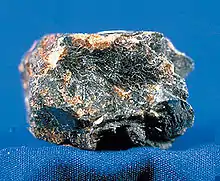sphalerite
See also: Sphalerite and sphalérite
English

Sphalerite
Etymology
From Ancient Greek σφαλερός (sphalerós, “unstable, unsteady, precarious”) + -ite; named in 1847.[1][2]
Pronunciation
- (US) IPA(key): /ˈsfæl.ə.ˌɹaɪt/, /ˈsfeɪ.lə.ˌɹaɪt/
Noun
sphalerite (plural sphalerites)
- (mineralogy) A yellow, brown or black, sometimes red, green white or colorless mineral with cubic crystals, of a chemical formula (Zn,Fe)S, often containing also minor metals, such as cadmium, gallium, germanium and indium.[1]
- 2009 February 6, Jamie J. Wilkinson et al., “Anomalously Metal-Rich Fluids Form Hydrothermal Ore Deposits”, in Science, volume 323, number 5915, , pages 764–767:
- The Monte Cristo and Philadelphia sphalerites have similar mean Pb concentrations (80 ppm) that are lower than the Lucky Dog sphalerites (119 ppm).
Synonyms
Derived terms
- sphaleritic
Translations
mineral
|
References
- Richard V. Gaines, H. Catherine W. Skinner, Eugene E. Foord, Brian Mason, and Abraham Rosenzweig: Dana's new mineralogy, John Wiley & Sons, 1997
- James D. Dana: Dana's System of Mineralogy. Volume I, 7th ed., revised by Charles Palache, Harry Berman, and Clifford Frondel. John Wiley & Sons, 1944
Further reading
- David Barthelmy (1997–2024) “Sphalerite”, in Webmineral Mineralogy Database.
- “sphalerite”, in Mindat.org, Hudson Institute of Mineralogy, 2000–2024.
This article is issued from Wiktionary. The text is licensed under Creative Commons - Attribution - Sharealike. Additional terms may apply for the media files.